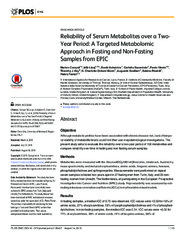Reliability of serum metabolites over a two-year period: A targeted metabolomic approach in fasting and non-fasting samples from EPIC
Permanent lenke
https://hdl.handle.net/10037/8631Dato
2015-08-14Type
Journal articleTidsskriftartikkel
Peer reviewed
Forfatter
Carayol, Marion; Licaj, Idlir; Achaintre, David; Vineis, Paolo; Key, Timothy J.; Moret, N. Charlotte Onland; Scalbert, Augustin; Rinaldi, Sabina; Ferrari, PietroSammendrag
Methods Metabolites were measured with the AbsolueIDQp180 kit (Biocrates, Innsbruck, Austria) by mass spectrometry and included acylcarnitines, amino acids, biogenic amines, hexoses, phosphatidylcholines and sphingomyelins. Measurements were performed on repeat serum samples collected two years apart in 27 fasting men from Turin, Italy, and 39 nonfasting women from Utrecht, The Netherlands, all participating in the European Prospective Investigation into Cancer and Nutrition (EPIC) study. Reproducibility was assessed by estimating intraclass correlation coefficients (ICCs) in multivariable mixed models.
Results In fasting samples, a median ICC of 0.70 was observed. ICC values were <0.50 for 48% of amino acids, 27% of acylcarnitines, 18% of lysophosphatidylcholines and 4% of phosphatidylcholines. In non-fasting samples, the median ICC was 0.54. ICC values were <0.50 for 71% of acylcarnitines, 48% of amino acids, 44% of biogenic amines, 36% of sphingomyelins, 34% of phosphatidylcholines and 33% of lysophosphatidylcholines. Overall, reproducibility was lower in non-fasting as compared to fasting samples, with a statistically significant difference for 19–36% of acylcarnitines, phosphatidylcholines and sphingomyelins.
Conclusion A single measurement per individual may be sufficient for the study of 73% and 52% of the metabolites showing ICCs >0.50 in fasting and non-fasting samples, respectively. ICCs were higher in fasting samples that are preferable to non-fasting.


 English
English norsk
norsk